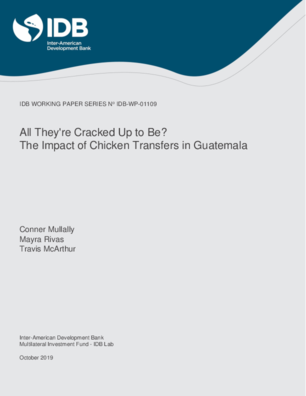All They're Cracked Up to Be?: The Impact of Chicken Transfers in Guatemala
Date
Oct 2019
We evaluate a program in Guatemala offering training and transfers of a local chicken variety using a randomized phase-in design with imperfect compliance. We do not find strong evidence for or against positive intent-to-treat effects on household-level outcomes, including indicators of expenditure, calorie and protein intake, diet quality, egg consumption and production, as well as chicken ownership and management. Among girls between the ages of six and 60 months, we find that the program reduced stunting by 23.5 (19.4) percentage points, while also improving other height and weight outcomes. Boys are more likely to suffer from intestinal illness, which could explain differences in program impacts by sex. Children in the poorest households experienced the largest impacts on dietary diversity and the probability of consuming animal-source foods, but these impacts did not translate into larger effects on height or weight.




